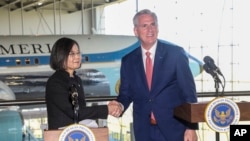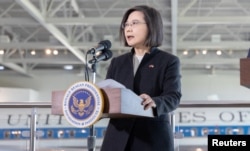U.S. House Speaker Kevin McCarthy met Wednesday with Taiwan’s President Tsai Ing-wen in California, calling her “a great friend to America.”
In a joint appearance, the two talked about the importance of U.S.-Taiwan ties, and the importance of defending democratic governance.
“We once again find ourselves in a world where democracy is under threat and the urgency of keeping the beacon of freedom shining cannot be understated,” Tsai said.
McCarthy said that the friendship between the two countries, “is critical to maintain economic freedom, peace and regional stability.”
Tsai warned that military threats from China, which claims Taiwan as part of its territory, also “cannot be understated.” She said Taiwan seeks “a peaceful status quo” and “strives to be a reliable partner to the world.”
The talks prompted opposition from China. Beijing announced a joint cruise and patrol operation in the north-central part of the Taiwan Strait, while the People’s Liberation Army said it had deployed two destroyers and a frigate to the East China Sea for live fire drills.
Both operations were believed to be a rebuke to Taiwan for Tsai’s two stopovers in the United States in less than a week.
Chinese authorities did not elaborate on the Taiwan Strait operation or whether the Chinese navy was joining it with surveillance vessels.
“This is not our intention to escalate,” McCarthy told reporters during a bipartisan press conference with the full delegation. “We want to continue to build and foster democracy and freedom. There should be no fear.”
But McCarthy did emphasize the Six Assurances, key principles laid down during the presidency of Ronald Reagan in the 1980s guiding U.S.-Taiwan relations.
“Prior to this, very few American politicians have been underscoring the Six Assurances as much, even though it's becoming more widely stated since the later years of Donald Trump,” Dean Chen, an associate professor of political science at the Ramapo College of New Jersey, told VOA. “I think McCarthy is trying to emphasize that to make it even more and more official going forward.”
Republican Representative Ashley Hinson, a member of the House Select Committee on Strategic Competition with China, told VOA a strong U.S.-Taiwan relationship sends an important message to other countries.
“We don't want you to be reliant upon China for your supply chain and for your manufacturing industries. I think we can help foster economic growth, which then in turn leads to freedom and opportunity everywhere,” she said.
The U.S. has a “One China” policy, which acknowledges that Beijing considers Taiwan to be part of China. The U.S. considers Taiwan’s status unsettled and sends military aid to the self-governed island to help it defend itself.
U.S. President Joe Biden has frequently said the U.S. would militarily defend Taiwan if China were to invade it, although Washington has maintained that its “One China” policy has not changed.
Representative Raja Krishnamoorthi, the ranking member on the House Select Committee on China, said the Chinese Communist Party’s promise to provide a one-China, two-systems policy if they reunify with Taiwan does not appear to be compatible after the world watched how the system was implemented in Hong Kong.
“That's why our bond with the Taiwanese people is unshakable. We will always support them in defending their freedom,” Krishnamoorthi said.
McCarthy told reporters he would like to see the Biden administration speed up its transfer of weapons delivery systems to Taiwan.
Tsai has not visited Washington and has said she is transiting through the U.S., with her two stops sandwiched around a visit to Central American allies Guatemala and Belize. Honduras recently announced it was cutting ties with Taiwan in favor of China.
Last year, Tsai hosted then-House Speaker Nancy Pelosi in Taiwan, and China reacted by holding its largest live fire military drills in decades around the self-governed island.
China's Ministry of Foreign Affairs said Thursday, “The U.S. colluded with Taiwan, connived separatist Taiwan independence forces to engage in political activities in the U.S. under the guise of so-called transit, carried out official exchanges with Taiwan, and enhanced substantive relations between the U.S. and Taiwan. This move severely violates the one-China principle.”
But Robert Ross, a political science professor at Boston College, told VOA, “We will not see a renewed incident similar to post-Pelosi. The Chinese are going to be cautious here and they're going to focus on imposing pain on Taiwan rather than a cross-strait crisis.”
Beijing’s one-China principle is different from the U.S. one-China policy. It holds that China has sovereignty over the mainland, Hong Kong, Macao and Taiwan.
Democratic Representative Seth Moulton, a member of the House Select Committee on Strategic Competition with China, told VOA, "The American public is very united with Congress and not wanting to have a war with China. That's the bottom line. And everything that we're doing is part of preventing, deterring that conflict,” he said.
VOA’s Mandarin Service contributed to this report. Some information came from The Associated Press and Reuters.







